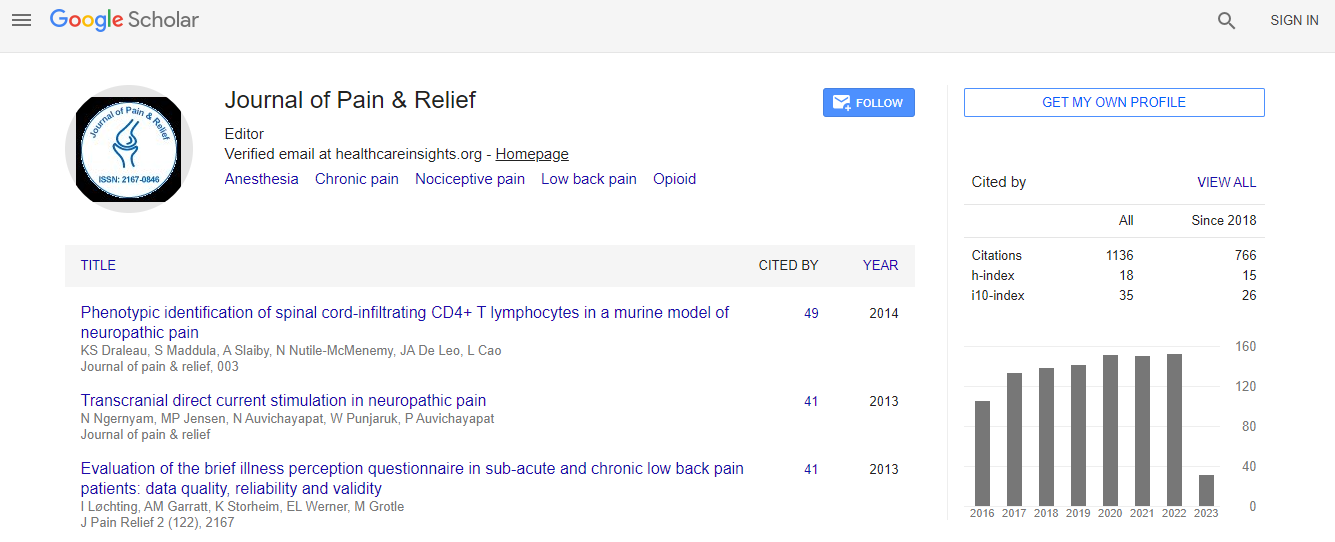Our Group organises 3000+ Global Conferenceseries Events every year across USA, Europe & Asia with support from 1000 more scientific Societies and Publishes 700+ Open Access Journals which contains over 50000 eminent personalities, reputed scientists as editorial board members.
Open Access Journals gaining more Readers and Citations
700 Journals and 15,000,000 Readers Each Journal is getting 25,000+ Readers
Google Scholar citation report
Citations : 1583
Journal of Pain & Relief received 1583 citations as per Google Scholar report
Journal of Pain & Relief peer review process verified at publons
Indexed In
- Index Copernicus
- Google Scholar
- Open J Gate
- Genamics JournalSeek
- Cosmos IF
- RefSeek
- Hamdard University
- EBSCO A-Z
- OCLC- WorldCat
- Publons
- Geneva Foundation for Medical Education and Research
- Euro Pub
- ICMJE
Useful Links
Recommended Journals
Related Subjects
Share This Page
Phantom limb pain: The human biofield and the role of psychological trauma
7th International Conference and Exhibition on Pain Research and Management
Eric Leskowitz
Spaulding Rehabilitation Hospital, USAOsher Institute for Integrative Medicine - Harvard Medical School, USA
Posters & Accepted Abstracts: J Pain Relief
Abstract
Phantom limb pain (PLP) is a form of chronic neuropathic pain that responds poorly to treatments derived from the neuroanatomic understanding of pain, such as surgical ablation and anti-convulsant or narcotic medications. Several new psychological and behavioral treatments that have proven effective eye movement desensitization and reprocessing (EMDR) and mirror box therapy - have been explained by invoking neural plasticity and repatterning of the cortical pain matrix as their mechanism of action. Other novel treatments that are based on an energy medicine or biofield model also appear to be quite effective. Documented results have been reported for therapeutic touch (a non-contact intervention), acupuncture and acupressure. One approach, utilizing exposure and desensitization with a somatic component, is called emotional freedom technique (EFT or tapping). The patient taps their own acupuncture points while stating affirmations of self-acceptance regarding the negative emotions associated with the amputation. Results are enhanced when the psychological trauma of the amputation itself is addressed, a factor that is generally overlooked in the standard surgical approach to limb amputation. A speculative trauma/energy model for the etiology of PLP is useful in explaining several anomalous aspects of PLP (responses are often too rapid to be explained by neural re-organization, patients are able to sense external objects with their phantom limb, and therapists are able to sense the existence of the phantom limb’s biofield in apparently empty space). The clinical efficacy of energy therapies can be understood by invoking the blockage and release of emotional energy, which may be equivalent to, or precursors of, the micro-currents and electromagnetic potential deviations known to develop at acupuncture points. This model, analogous to the well-documented phantom leaf effect, is proposed as a step in the development of simple and effective energy-based and trauma-oriented treatment protocols for this widespread and largely treatment-resistant disorder. Recent Publications: 1. Church D, et al. (2013) Psychological trauma symptom improvement in veterans using emotional freedom techniques. Journal of Nervous and Mental Disorders 201:153–160. 2. Leskowitz E (2000) Phantom limb pain treated with therapeutic touch. Archives of Physical Medicine and Rehabilitation 81:522–524. 3. Hubacher J (2015) The phantom leaf effect: a replication. Journal of Alternative and Complementary Medicine 21(2):83-90.Biography
Eric Leskowitz MD was a Consultant Psychiatrist to the Pain Management Program at Spaulding Rehabilitation Hospital in Boston for over 25 years, and was also the Director of the Hospital’s Integrative Medicine Task Force. A board-certified psychiatrist, he held an appointment with the Department of Psychiatry at Harvard Medical School for over 20 years. He has studied energy healing, meditation and hypnosis for almost 40 years, and has written widely and presented workshops internationally on the integration of subtle energy techniques with the allopathic medical model. He serves on the Advisory Boards of three journals and has edited three textbooks: Transpersonal Hypnosis: Gateway to Body, Mind and Spirit, Complementary and Alternative Medicine in Rehabilitation, and Sports, Energy and Consciousness: Awakening Human Potential through Sport. His documentary film about group energies and sports, “The Joy of Sox: Weird Science and the Power of Intention”, was broadcast nationally in 2012.
E-mail: eleskowitz@partners.org

 Spanish
Spanish  Chinese
Chinese  Russian
Russian  German
German  French
French  Japanese
Japanese  Portuguese
Portuguese  Hindi
Hindi 
